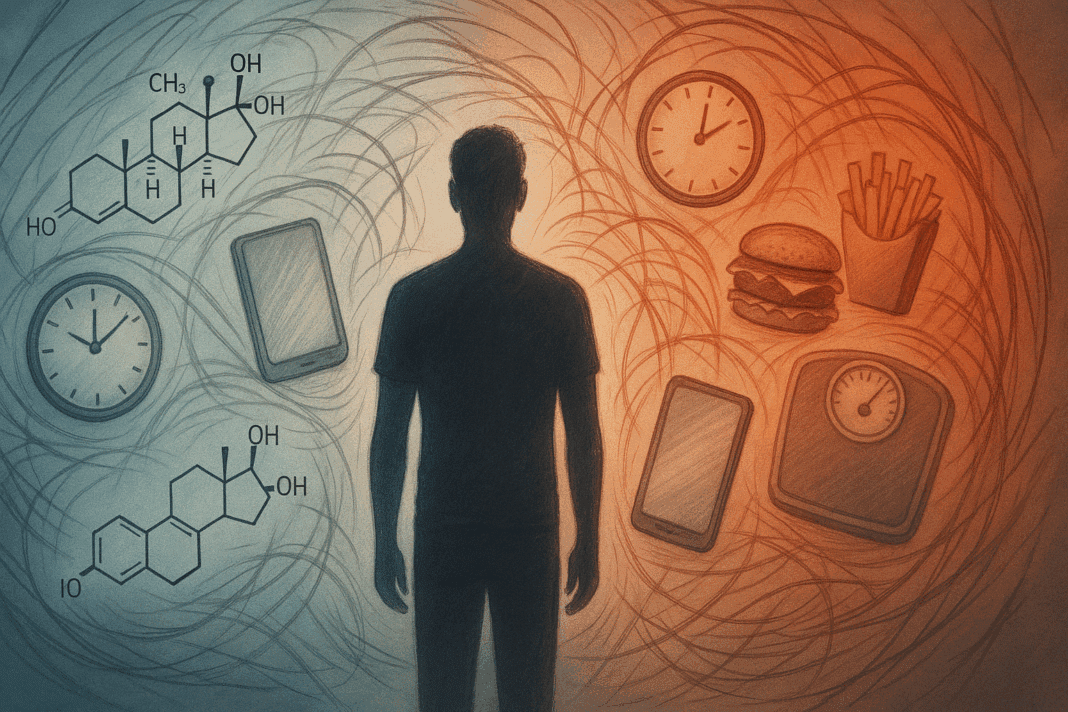Stress is a constant companion in modern life, but its influence extends far beyond emotional discomfort. Many people who experience long-term stress also report challenges with weight regulation. This connection isn’t purely anecdotal. Scientific research is increasingly pointing toward a complex interplay between psychological stress, hormonal fluctuations, and physiological responses that contribute to weight changes. The question, “can stress lead to weight gain?” is more than rhetorical—it’s a legitimate concern that touches both mental and physical wellness. As we explore this topic in depth, we aim to understand how chronic stress can affect metabolism, eating habits, hormonal balance, and overall health.
You may also like: How to Stop Emotional Eating and Regain Control: Mindful Nutrition Strategies That Support a Healthier Lifestyle
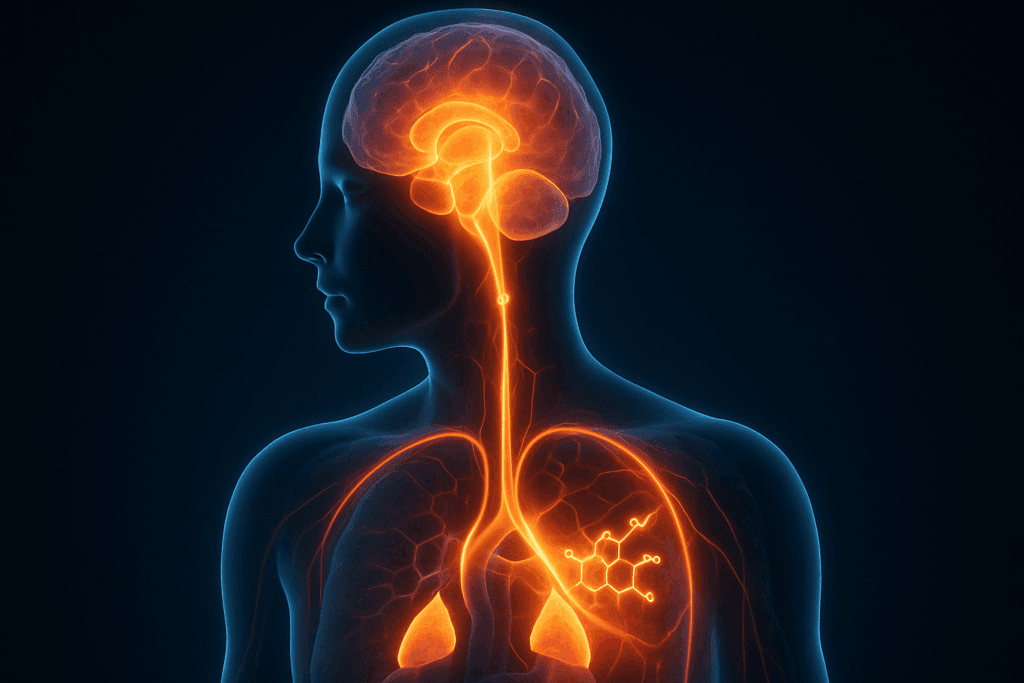
The Physiology of Stress: What Happens Inside the Body
To understand the link between stress and weight changes, we must first examine what happens physiologically during periods of stress. The body’s stress response is orchestrated by the hypothalamic-pituitary-adrenal (HPA) axis. When a person perceives a threat, real or imagined, the brain signals the adrenal glands to release a cascade of stress hormones—most notably cortisol. Cortisol prepares the body for “fight or flight” by increasing blood sugar levels, enhancing brain function, and suppressing nonessential processes such as digestion and reproduction.
Short bursts of cortisol can be protective and adaptive. However, when stress becomes chronic, the persistent elevation in cortisol levels can start to disrupt the body’s natural balance. The question of “does cortisol cause weight gain?” is rooted in this prolonged hormonal imbalance. Chronic stress and its associated hormonal output, particularly elevated cortisol, can influence fat storage patterns, hunger regulation, and energy usage, potentially leading to weight gain over time.
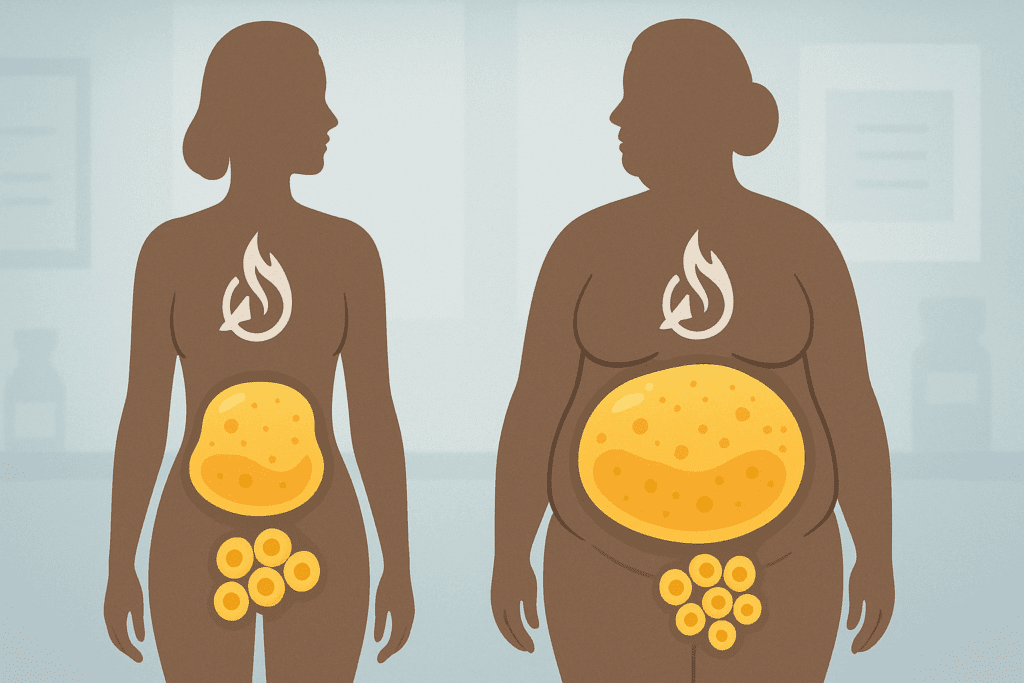
Cortisol and Weight Gain: A Hormonal Perspective
A growing body of evidence links high cortisol levels and weight gain. Cortisol, often referred to as the “stress hormone,” has a profound effect on the body’s metabolism. It promotes fat storage, particularly in the abdominal region. This type of fat, known as visceral fat, is metabolically active and associated with increased risk for cardiovascular disease, insulin resistance, and type 2 diabetes.
The biological drive to store fat in times of stress is an evolutionary adaptation. Thousands of years ago, our ancestors faced threats that required immediate energy expenditure, such as fleeing from predators. The body stored energy in the form of fat to ensure survival. Today, however, the body cannot distinguish between psychological stressors and physical threats. As a result, high cortisol levels and weight gain have become closely linked, even when the stressor is a demanding job or emotional turmoil rather than physical danger.
When we ask, “can high cortisol cause weight gain?” the answer is yes, especially when it interacts with other factors like poor sleep, lack of exercise, and a high-sugar diet. Studies have shown that elevated cortisol not only promotes fat accumulation but also increases appetite, leading individuals to seek out high-calorie, comfort foods that offer temporary emotional relief.
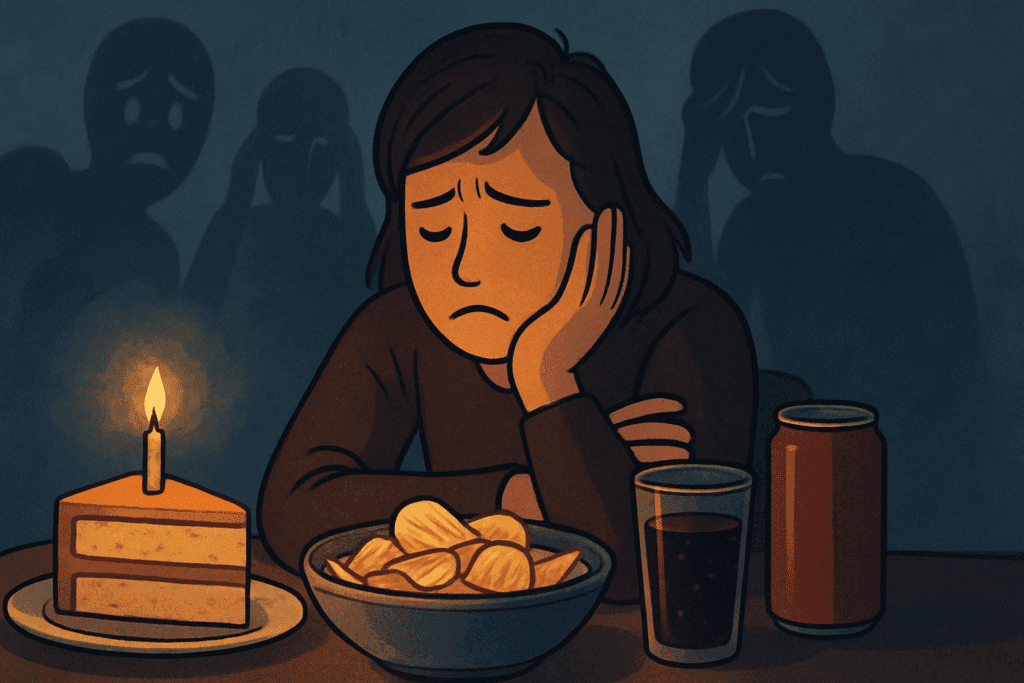
The Role of Emotional Eating and Appetite Regulation
One of the most significant behavioral links between stress and weight gain lies in the realm of emotional eating. Chronic stress alters hunger hormones like ghrelin and leptin, which regulate satiety and hunger cues. Elevated cortisol levels can blunt leptin’s effectiveness, reducing the sensation of fullness, while simultaneously increasing ghrelin, which stimulates appetite. This imbalance creates a perfect storm for overeating.
Emotional eating is not just about consuming food in response to feelings; it’s about using food as a coping mechanism. Many individuals find solace in sugary or fatty foods during times of stress. While this may provide a brief sense of comfort, it often leads to a cycle of guilt, weight gain, and further emotional distress. This repetitive pattern reinforces the connection between stress and weight gain.
Moreover, stress can erode our decision-making capacity and impulse control. This cognitive exhaustion makes it more difficult to stick to a healthy eating plan or make thoughtful dietary choices. When people wonder, “does stress make you gain weight?” they are often referencing this cycle of emotional eating, where caloric intake increases without an associated increase in physical activity or energy expenditure.
Does Anxiety Contribute to Weight Gain?
While stress and anxiety are not synonymous, they often coexist and exert similar physiological effects. Anxiety disorders, especially when left unmanaged, can result in chronic activation of the HPA axis, mirroring the biological processes triggered by stress. Therefore, asking “can anxiety cause weight gain?” is both logical and necessary.
Persistent anxiety can produce symptoms such as sleep disruption, fatigue, irritability, and difficulty concentrating—all of which may indirectly affect weight. Sleep deprivation, for instance, is strongly linked to elevated cortisol levels and insulin resistance, two key contributors to weight gain. Additionally, anxiety may drive behaviors like emotional eating, sedentary habits, and increased reliance on convenience foods, all of which can lead to weight gain.
It is equally important to consider the reverse effect—can stress lead to weight loss? In some individuals, chronic stress and anxiety may suppress appetite, leading to unintentional weight loss. This variability underscores the personalized nature of stress responses, shaped by genetic, behavioral, and environmental factors. Thus, while stress and weight gain are commonly linked, they do not manifest identically in every individual.
Cortisol, Cravings, and Nutrient Storage
Beyond influencing appetite and fat storage, cortisol plays a role in determining the types of foods we crave. High cortisol levels often lead to increased cravings for carbohydrate-rich and sugary foods. This is partially due to the body’s desire for quick energy and serotonin-boosting foods that temporarily alleviate mood disturbances caused by stress.
Interestingly, the metabolic impact of stress-related eating is not neutral. The body is more likely to store consumed calories as fat when under stress, particularly in the visceral area. This biological inclination explains why some individuals struggle to lose weight despite eating seemingly moderate amounts of food. The interaction between cortisol and weight gain becomes even more pronounced when meals are eaten in a rushed, distracted, or anxious state. This phenomenon further complicates the question of how to lose stress weight, as it requires more than simple calorie restriction.
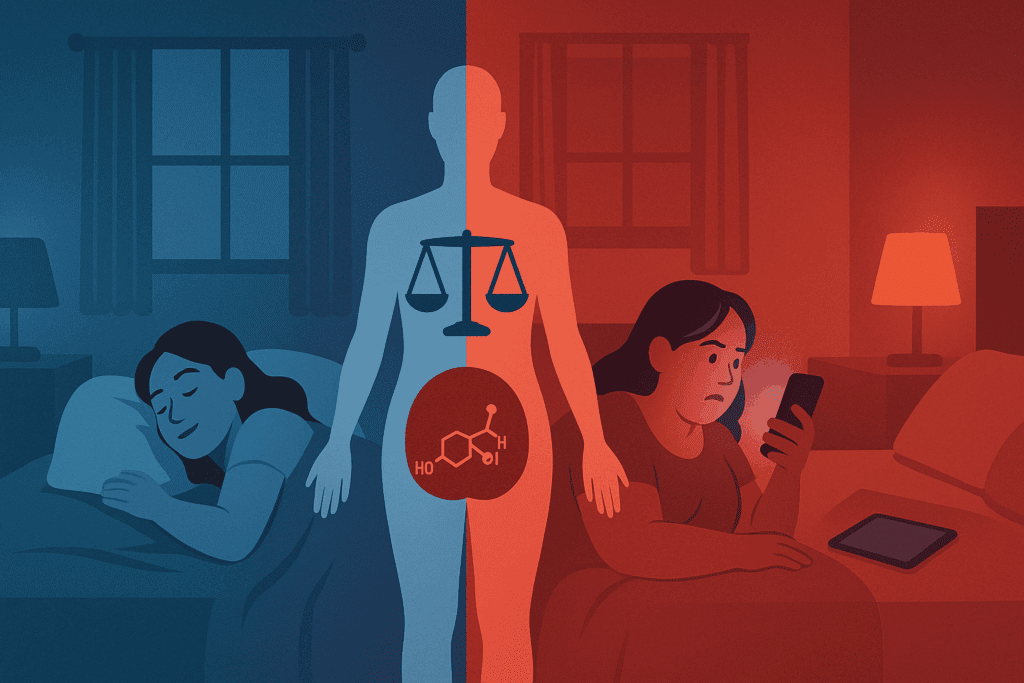
Sleep, Stress, and Metabolism
Sleep plays a central role in the stress-weight gain equation. Chronic stress can interfere with both the duration and quality of sleep, which in turn influences hormonal regulation. Poor sleep elevates cortisol levels, disrupts insulin sensitivity, and skews hunger hormones. These effects collectively impair metabolic function, making weight management more challenging.
When sleep is disrupted, the body increases production of ghrelin, the hormone that signals hunger, while decreasing leptin, the hormone that indicates fullness. As a result, sleep-deprived individuals are more likely to overeat, particularly in the evening hours when willpower tends to wane. In this way, the cycle of stress and weight gain is perpetuated. Without adequate sleep, the body remains in a state of heightened alert, continuously releasing cortisol and exacerbating the hormonal imbalances that drive weight gain.
The Vicious Cycle of Stress and Weight
The interplay between stress and weight is often cyclical. Weight gain can become a source of additional stress, further increasing cortisol production and emotional distress. This feedback loop makes it increasingly difficult to break free from unhealthy patterns. Individuals may find themselves asking repeatedly, “does stress make you put on weight?” as they struggle with the emotional and physical consequences of chronic stress.
Furthermore, societal pressures regarding body image can intensify this cycle. People who gain weight as a result of stress may feel ashamed or guilty, leading to more stress, anxiety, and subsequent emotional eating. The stigmatization of weight gain often causes individuals to engage in restrictive dieting or overexercising, both of which can be counterproductive and lead to further hormonal disruption.
Understanding this cycle is essential for developing effective, compassionate strategies for weight management that consider the emotional and physiological dimensions of health. It’s not just about asking, “can stress make you gain weight?” but rather, “how can we break the cycle to support long-term well-being?”

Strategies for Breaking the Cycle and Losing Stress Weight
Reversing stress-induced weight gain requires a multifaceted approach. First and foremost, stress management must become a daily priority. This involves identifying and addressing the root causes of stress, whether they stem from work, relationships, finances, or other life circumstances. Mindfulness practices, such as meditation, yoga, and deep-breathing exercises, can significantly reduce cortisol levels and promote a sense of calm.
Regular physical activity is another cornerstone of stress and weight gain prevention. Exercise not only burns calories but also lowers cortisol levels, boosts mood-enhancing endorphins, and improves insulin sensitivity. Importantly, the type of exercise matters. While intense training can be beneficial, too much high-intensity activity without adequate recovery can actually elevate cortisol. Therefore, incorporating low-impact movement like walking, stretching, or swimming can help balance the body’s stress response.
When considering how to lose stress weight, dietary choices also play a critical role. Consuming nutrient-dense, whole foods can stabilize blood sugar and reduce inflammation. Foods rich in magnesium, omega-3 fatty acids, and B vitamins are particularly helpful for supporting the nervous system and regulating cortisol. Additionally, avoiding excessive caffeine, alcohol, and processed foods can prevent further hormonal disruption.
Behavioral therapy, such as cognitive-behavioral therapy (CBT), can help individuals address the thought patterns and emotional triggers that lead to stress eating. CBT encourages the development of healthier coping mechanisms and fosters greater emotional awareness. For those dealing with significant anxiety, working with a mental health professional may also be necessary to reduce symptoms and improve overall well-being.
Creating a supportive environment is equally important. Surrounding oneself with understanding friends, family, or a therapeutic community can alleviate isolation and provide accountability. The process of reversing stress weight gain is not linear, and setbacks are normal. Patience, self-compassion, and persistence are essential throughout the journey.
Rethinking the Narrative: Beyond the Scale
While addressing physical weight is important for many, it is equally crucial to shift the conversation toward holistic wellness. Weight is just one marker of health, and it does not exist in isolation. Individuals struggling with weight changes related to stress should be encouraged to evaluate other aspects of their well-being, such as sleep quality, emotional resilience, and energy levels.
By focusing on the broader picture, individuals can foster a healthier relationship with their bodies and food. This holistic approach also empowers people to recognize the internal cues of hunger, satiety, and emotional needs, rather than solely relying on external diet rules or societal expectations. In this context, the question “will stress make you gain weight?” transforms into a deeper inquiry about how we support our bodies and minds under pressure.
Recognizing Individual Differences in Stress Response
Not everyone responds to stress in the same way. Genetic predispositions, early life experiences, personality traits, and current life circumstances all influence how an individual processes stress. For some, stress suppresses appetite and leads to weight loss, while for others, it prompts emotional eating and weight gain. This variability reinforces the need for personalized wellness plans.
Healthcare professionals should consider these individual differences when advising patients on weight management strategies. Rather than assuming that stress and weight gain are universally linked, providers should assess each person’s unique context, hormonal profile, and coping style. This personalized approach aligns with the principles of functional and integrative medicine, which prioritize root cause analysis and individualized treatment.
In this framework, questions like “can stress lead to weight loss?” are not contradictory to “can stress cause weight gain?” Instead, they illustrate the multifaceted nature of the human stress response. Tailoring interventions to the individual’s needs and experiences is the most effective way to promote sustainable health outcomes.
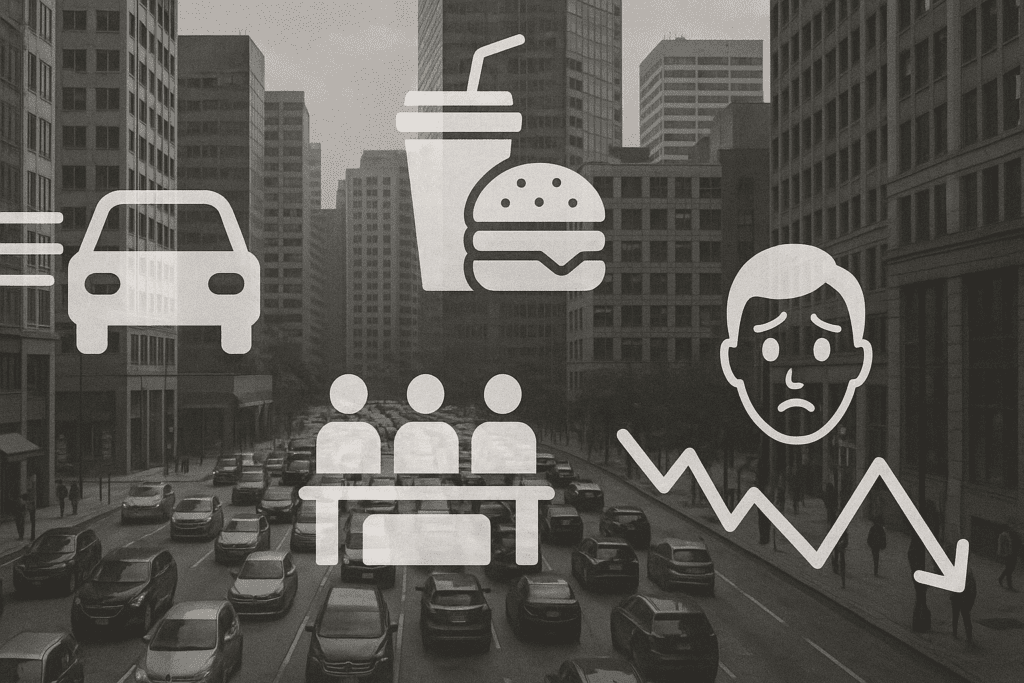
Understanding Stress and Weight Gain as a Public Health Concern
Beyond individual health, the relationship between stress and weight gain is a public health issue. Rising rates of obesity, metabolic disorders, and mental health conditions underscore the need for systemic solutions. Workplace stress, socioeconomic inequality, inadequate access to mental healthcare, and food insecurity all contribute to chronic stress and its downstream effects.
Addressing these systemic contributors requires collaboration among healthcare providers, policymakers, educators, and community leaders. Initiatives that promote mental health awareness, stress reduction, and equitable access to nutritious foods can help mitigate the burden of stress-related weight gain. Public health campaigns should also focus on destigmatizing weight gain and promoting body diversity, encouraging people to seek help without fear of judgment.
A comprehensive public health strategy must acknowledge that the question “does stress lead to weight gain?” is not merely a personal concern but a societal challenge. By recognizing the broader determinants of stress and health, we can build more resilient, supportive environments that foster both physical and emotional well-being.
Frequently Asked Questions: Can Stress Lead to Weight Gain?
What are some lesser-known ways that stress alters how our body processes food?
Stress doesn’t just influence how much we eat; it also alters how we metabolize the food we consume. Chronic stress can slow down digestion, reduce nutrient absorption, and interfere with gut microbiota balance, all of which can lead to gastrointestinal distress and inefficient calorie utilization. This metabolic disruption often goes unnoticed but contributes to the underlying link between cortisol and weight gain. As cortisol levels rise, the body’s ability to process glucose and lipids becomes impaired, making it more likely to store food as fat, especially in the abdominal area. Thus, even if caloric intake remains consistent, stress may still cause gain weight by changing how the body handles food at the cellular level.
Can workplace stress significantly influence weight patterns over time?
Yes, long-term exposure to workplace stress is a major factor in chronic weight changes, particularly when paired with sedentary behaviors and poor dietary options. High-pressure environments with limited breaks or unrealistic deadlines can lead to elevated cortisol levels and weight gain. When individuals are constantly in a fight-or-flight mode at work, their bodies may begin to store energy in preparation for perceived threats. This biological programming helps explain why workplace tension can make stress and weight gain so intertwined. Moreover, people often cope with professional burnout by snacking, skipping meals, or choosing comfort foods, further reinforcing the cycle.
Is it possible to experience weight fluctuations due to stress rather than consistent gain or loss?
Absolutely. While many people ask, “can stress cause weight gain?” or “can stress lead to weight loss?” the truth is that stress can cause fluctuating weight patterns. These inconsistencies stem from cycles of overeating followed by periods of appetite suppression, as well as disrupted sleep and irregular eating schedules. Such fluctuations are often more pronounced during transitional life phases like job changes, academic pressures, or major relocations. This makes it harder to detect clear patterns, but it doesn’t negate the role of cortisol and weight gain in contributing to long-term metabolic disruption.
Can mindfulness-based stress reduction actually help reverse stress-related weight gain?
Mindfulness techniques have gained traction not only for emotional regulation but also for improving physical health, including weight management. Practices like meditation, mindful eating, and breathing exercises can lower cortisol levels, stabilize mood, and reduce impulsive eating behaviors. When stress is actively managed, people are less likely to fall into the trap of emotional eating, which means stress and weight gain no longer reinforce each other. Research shows that even short daily mindfulness sessions can influence cortisol levels and weight gain positively over time. This approach fosters a deeper awareness of hunger cues and emotional triggers, making it a valuable tool for sustainable health.
How do hormonal imbalances during perimenopause or andropause affect stress and weight gain?
Hormonal transitions such as perimenopause and andropause create a perfect storm where stress can significantly impact weight. During these phases, estrogen and testosterone levels decline, which already alters fat distribution and metabolism. When combined with elevated cortisol levels and weight gain mechanisms, the result is often increased abdominal fat and reduced muscle mass. People in midlife may wonder, “does high cortisol cause weight gain even if I exercise and eat well?” Unfortunately, the answer is often yes, because hormonal shifts amplify stress sensitivity and metabolic resistance. Managing both the endocrine and emotional dimensions of these life stages is essential for maintaining a healthy weight.
Does social isolation amplify the effects of stress-related weight gain?
Social isolation can dramatically intensify the connection between stress and weight gain by eliminating important coping mechanisms. Humans are inherently social, and the absence of supportive relationships can heighten anxiety, raise cortisol, and exacerbate emotional eating. People may ask, “can anxiety cause weight gain in people who feel lonely?” and the answer is yes—loneliness has been shown to increase inflammation, worsen sleep, and reduce motivation for physical activity. The combination of psychological stress and lack of social engagement creates a feedback loop where both weight gain and emotional suffering are more difficult to reverse. Community involvement and regular social contact can buffer these effects significantly.
Are there medical conditions that mimic or worsen cortisol-related weight gain?
Several underlying medical issues can magnify or mask the effects of cortisol and weight gain, making diagnosis more complicated. Conditions like Cushing’s syndrome, polycystic ovary syndrome (PCOS), and thyroid imbalances can all elevate cortisol levels or alter how cortisol functions in the body. When someone experiences rapid fat accumulation, especially in the face or midsection, they might ask, “does cortisol cause weight gain even if I eat clean?” In some cases, these medical conditions are the hidden culprits. Seeking medical evaluation to rule out or manage these diseases is essential when unexplained weight gain occurs alongside chronic stress symptoms.
How can someone distinguish between weight gain from stress and other lifestyle factors?
Discerning the source of weight gain requires evaluating not only diet and exercise but also emotional and environmental triggers. When someone asks, “does stress make you gain weight?” it’s important to look for patterns such as eating when anxious, sleeping poorly, or feeling fatigued without cause. Stress-related weight gain is often accompanied by increased cravings for high-sugar or high-fat foods, particularly during emotionally charged periods. Conversely, lifestyle factors like overeating out of habit, lack of movement, or poor hydration are typically more predictable and consistent. Keeping a detailed journal of stressors, meals, physical activity, and mood changes can help isolate whether stress is the primary driver.
What role do nighttime habits play in the cortisol and weight gain connection?
Evening routines have a profound effect on cortisol levels and weight gain, often more than people realize. Using electronics late at night, consuming caffeine after 2 p.m., or engaging in stimulating conversations close to bedtime can prevent cortisol from tapering off naturally. This disrupts the body’s circadian rhythm, leading to poor sleep and morning fatigue. People frequently notice that their nighttime snacking habits and screen time escalate during periods of high stress, prompting the question, “does stress make u gain weight even when you sleep poorly?” Unfortunately, disrupted rest amplifies cortisol production, making it more likely that the body will store fat the next day. Prioritizing a calming nighttime routine can be a powerful strategy in reversing this pattern.
Are there cultural or societal pressures that affect how we link stress and weight gain?
Yes, cultural norms and societal expectations can shape not only our emotional responses to stress but also how we interpret weight changes. In some societies, gaining weight is stigmatized more heavily, adding psychological stress to an already difficult situation. This can prompt individuals to ask, “will stress make you gain weight even if I feel emotionally stable?” The answer often lies in how deeply embedded societal cues affect self-perception and behavior. People may engage in extreme dieting or avoidance behaviors that backfire, leading to increased cortisol and weight gain. Creating space for more body-positive, inclusive health narratives can help reduce this pressure and improve long-term outcomes.
Conclusion: Breaking the Link Between Chronic Stress, Cortisol, and Weight Gain
The intricate relationship between stress, cortisol, and weight gain reflects the profound interconnectedness of mind and body. While it is medically accurate to state that high cortisol levels and weight gain are often linked, this connection is far from simplistic. Multiple biological, behavioral, and environmental factors converge to influence how individuals respond to stress and how their bodies adapt.
Chronic stress can lead to hormonal imbalances that promote fat storage, disrupt appetite regulation, and interfere with metabolic processes. These effects are often compounded by emotional eating, poor sleep, and reduced physical activity. Additionally, anxiety—a close companion of stress—can further complicate this picture, affecting both behavior and physiology in ways that encourage weight gain.
Addressing this issue requires more than just asking, “can stress make you gain weight?” It demands a comprehensive understanding of how to manage stress effectively, nurture mental health, and support the body’s natural balance. Whether through mindfulness, therapy, nutrition, or community support, the path to reversing stress-related weight gain is both achievable and deeply personal.
Ultimately, understanding the link between stress and weight gain empowers individuals to make informed, compassionate choices for their health. By breaking the cycle of chronic stress and prioritizing holistic wellness, we can build a more resilient, vibrant, and health-conscious future.
Was this article helpful? Don’t let it stop with you. Share it right now with someone who needs to see it—whether it’s a friend, a colleague, or your whole network. And if staying ahead on this topic matters to you, subscribe to this publication for the most up-to-date information. You’ll get the latest insights delivered straight to you—no searching, no missing out.
Further Reading:
Stress and Weight Gain: Understanding the Connection
Stress and weight gain: The connection and how to manage it
Disclaimer
The information contained in this article is provided for general informational purposes only and is not intended to serve as medical, legal, or professional advice. While NewsHealthWatch strives to present accurate, up-to-date, and reliable content, no warranty or guarantee, expressed or implied, is made regarding the completeness, accuracy, or adequacy of the information provided. Readers are strongly advised to seek the guidance of a qualified healthcare provider or other relevant professionals before acting on any information contained in this article. NewsHealthWatch, its authors, editors, and contributors expressly disclaim any liability for any damages, losses, or consequences arising directly or indirectly from the use, interpretation, or reliance on any information presented herein. The views and opinions expressed in this article are those of the author(s) and do not necessarily reflect the official policies or positions of NewsHealthWatch.

